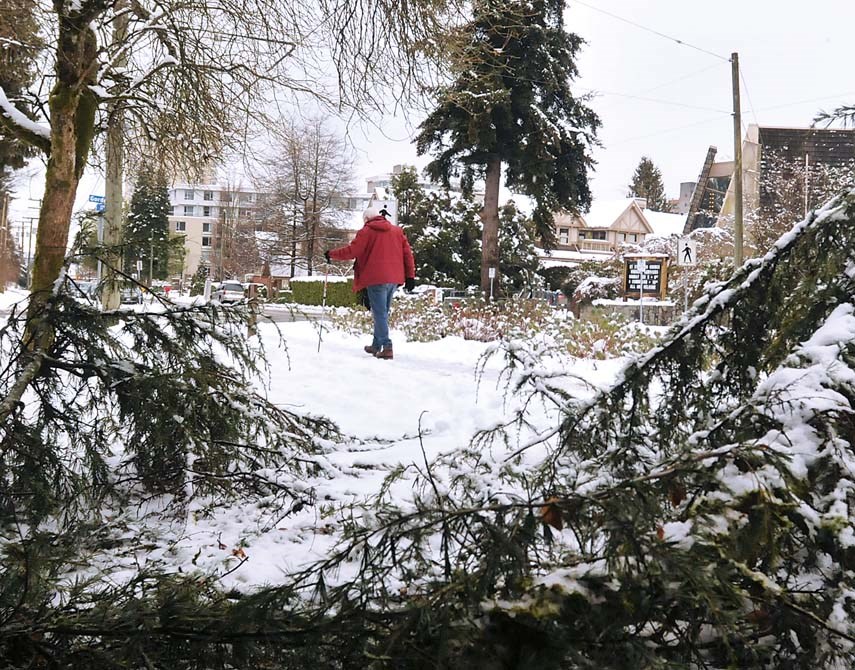It is winter again in the Lower Mainland, and with the season comes dreary rain, perhaps a little snow at times, biting wind and cold.
Every winter, seniors are at an increased risk of depression, isolation, and other health related issues. These factors can adversely affect senior’s well-being and independence. With COVID-19 still very much with us, risk factors are substantially increased. Still, there are strategies for seniors to manage the winter months despite the usual risk factors as well as COVID-19.
Along with the restrictions imposed by inclement weather and risky outdoor conditions normally experienced in the winter, COVID-19 has now forced new restrictions on seniors. Able-bodied seniors, under normal circumstances, could navigate the bad weather conditions to get out of the house and go to their favourite seniors’, recreation, and community centres for activities or to socialize with their peers.
But with the COVID-19 reality, many restrictions have been imposed on the organizations providing seniors programming and this adversely affects seniors.
Many of these centres have reopened with limited programming – a good sign but still not the full services that seniors normally enjoy. However, for less able-bodied seniors who need specialized programs or who may just want to socialize, these centres are not an easy option at this time.
One of the managers of a centre on the North Shore recently said that she regrets that her organization cannot provide in-person social gathering spaces for informal drop-ins, which normally are a mainstay for servicing isolated and lonely seniors.
The COVID-19 situation and the other winter conditions can have a detrimental effect on seniors who might be experiencing higher levels of depression and isolation.
On the North Shore there has been an increase in seniors availing themselves of online and phone counselling for depression, more volunteers are reaching out to isolated seniors who are needing increased support, and friendly phoners are finding many seniors struggling with the COVID-19 restrictions.
Organizations have innovated and provided what support they can, including dropping off gift packages, increasing food delivery programs with, perhaps, a note of encouragement enclosed, sending out care cards, stepping up their friendly phoning programs and reaching out through online messaging.
What can you do as an individual during this difficult time? One key strategy is to stay healthy. Apart from getting a flu shot, look for ways to boost your immunity, exercise and eat well. To keep up your exercise program get outside for a walk even if it is only around a few blocks. It might be worth buying warmer and appropriate clothing so you can get out and about outside. Invest in a warmer jacket and perhaps fleece lined pants and boots which have good traction. Some people think there is no such thing as bad weather, only bad clothing.
Also perhaps try some online exercise classes – many of the organizations on the North Shore are offering these. Check out the 2020 Seniors Directory for a senior’s centre providing these. (Pick up a copy at North Shore News during office hours.)
Staying healthy also means being careful when you are out and about. Be careful getting out of your car, avoid taking shortcuts, take extra time, pay attention and do not get distracted while outdoors. Keep your driveway and walkways salted and clear. Stay active to maintain strong muscles and bones, as they are important in falls prevention.
A second strategy is eating well. There has been lots of talk about the “COVID 15” that people have been slowly putting on as they cope with the pandemic. With more time on our hands, people are baking more, eating more to cope with boredom and cooking new but perhaps unhealthy and fattening meals. Try instead to go back to a diet consisting of regular balanced and nutritional meals (veggies, fruit and protein) and maybe ease up on baking those sugary, fat-laden treats. For strong bones, it is especially important to eat foods high in vitamin D and calcium and/or take supplements to get the recommended daily intake.
If you are bored, get out a game, start a craft project, read one of those books you always meant to, call a friend or relative, or perhaps sign up to do some COVID-19 safe volunteering. Try contacting BC 211 safe seniors, strong communities at bc211.ca/safe-seniors-strong-communities. They match seniors who need support with volunteers looking to give support. Many North Shore groups are always looking for people – connect with North Shore Community Resources Society to see where you might fit in. They can be reached at 604-985-7138.
Staying connected is perhaps the best strategy to keep from getting depressed and isolated. A lack of social interaction during the winter months is one of the risk factors to overcome.
Try to stay connected to friends and family, try chatting with friends on the phone or invite friends to take a physically distanced walk with you. And of course, as I said earlier, try volunteering.
Winter does have its magical aspects, cozying down with a blanket and good book or movie, or enjoying a crisp, cold sunny winter day, but it does have its drawbacks. Let’s weather these days and stay healthy and well.
Margaret Coates is the co-ordinator of Lionsview Seniors’ Planning Society. She has lived on the North Shore for 50 years and has worked for and with seniors for 25 of those years. Ideas for future columns are welcome Email: lions_view@telus.net



